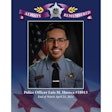In the year since the Virginia Tech massacre, college administrators have wrestled with how to adequately address student safety on campus. Many are turning to university law enforcement, requesting an increased presence by officers on campus. To make this possible, campus police departments are receiving enhanced training and funds allocation to upgrade equipment and facilities in hopes of avoiding another tragic school shooting.
In response to this security challenge the University of Iowa police department (UIPD) has undergone a comprehensive transformation resulting in an all-encompassing improvement in the department's professionalism. The culmination of this transformation came on October 31, 2007, when in response to the Virginia Tech shootings the Iowa Board of Regents approved arming officers at Iowa's three public universities for the first time in 40 years.
Until the late 1960s Iowa's public university officers carried firearms. At the height of Vietnam War protests a decision was made to remove firearms from this politically charged environment for philosophical reasons. Since 1969 officers have only had non-lethal force at their disposal for carrying out their law enforcement duties.
Iowa's universities are not unique in seeing these changes come to their public safety departments. "There is a national trend to militarize campus law enforcement," says Robert McCrie, a 37-year veteran of the study of law enforcement and professor at John Jay College, in New York.
In reality, the university police were already firearms certified. "The officers at the University of Iowa go through the same rigorous certification process and academy training as any other state or local Iowa law enforcement officer," says UIPD Associate Director Dave Visin, who has been with the department since 1987. In fact, UIPD officers qualify twice yearly in weapons training, although the state only requires a single test.
The department has been provisionally armed since 2004, which allowed for the deployment of weapons on a pre-approved basis. "The problem with provisional arming is it's ineffective unless you know about the danger ahead of time," says William Searls, a UIPD associate director and 17-year veteran of the Coralville police department.
Within three weeks of the Iowa Regent's vote UIPD officers reported for duty equipped with Sig Sauer P229 .40-caliber semi-automatic pistols. Officers at Iowa State carry the same gun, while the University of Northern Iowa selected the .40 caliber Glock 22 pistol.
In February Iowa and Iowa State made the decision to change the handguns they carry to the .40 caliber Smith & Wesson M & P, due to its interchangeable grip, accuracy, weight, and additional magazine capacity. There also is a desire to follow the lead of Iowa's state troopers, who have been carrying the Smith & Wesson pistol for more than a year.
The changes now in place at the UIPD began in 1995 when Charles Green was selected to become the director of the Department of Public Safety (DPS). Under Green's direction the public safety budget has increased from $2.57 million in 1999 to a projected $4.62 million this year. The force consists of 34 sworn police officers. Additionally, full-time security guards and part-time student guards handle routine campus security and staff the art museum's security needs.
"Being part of a university police department is different from a municipal police department; it serves a different community," says Director Green.
Typically, campus law enforcement is an entry-level position for people seeking law enforcement careers. This makes recruitment of quality candidates and retention of current ranks an ongoing struggle for any campus department. Younger officers in particular, looking for real action, are hard to keep.
"There were officers at UIPD before that that I would have been hesitant to clear a house with, from a competence level," says Sgt. Troy Kelsay, a 21-year veteran of the Iowa City and Coralville police departments. "They have since gotten the deadwood, dead branches, to shake off the tree. Director Green is to be credited with the changes at UIPD."
In 2001 Green fought for and secured the designation of "police department" for the DPS. To emphasize this change, new black uniforms were purchased, the squad cars were repainted black and white, and all signs and patches were replaced to indicate the police department title.
Although the university is committed to becoming the employer of choice for individuals seeking law enforcement careers, currently the UIPD is the lowest paid of the four Iowa City area police agencies, with a beginning salary of $34,682 before certification. Upon successfully completing academy training salary increases to $36,248. Only $2,300 separates the university's post-certification starting salary from that of the Johnson County Sheriff's Department, which offers the area's highest starting pay.
— Peter C. Wilson












